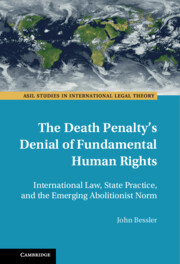 The Death Penalty's Denial of Fundamental Human Rights
The Death Penalty's Denial of Fundamental Human Rights Book contents
- The Death Penalty’s Denial of Fundamental Human Rights
- ASIL Studies in International Legal Theory
- Frontispiece
- The Death Penalty’s Denial of Fundamental Human Rights
- Copyright page
- Dedication
- Epigraph
- Contents
- Preface
- Acknowledgments
- Introduction
- 1 The Death Penalty
- 2 The Abolitionist Movement
- 3 Death Threats and the Law of Torture
- 4 Human Dignity and the Law’s Evolution
- Conclusion
- Bibliography
- Index
1 - The Death Penalty
From Draconian Legal Codes to the Enlightenment
Published online by Cambridge University Press: 01 December 2022
- The Death Penalty’s Denial of Fundamental Human Rights
- ASIL Studies in International Legal Theory
- Frontispiece
- The Death Penalty’s Denial of Fundamental Human Rights
- Copyright page
- Dedication
- Epigraph
- Contents
- Preface
- Acknowledgments
- Introduction
- 1 The Death Penalty
- 2 The Abolitionist Movement
- 3 Death Threats and the Law of Torture
- 4 Human Dignity and the Law’s Evolution
- Conclusion
- Bibliography
- Index
Summary
This chapter notes how ancient societies used capital punishment, highlighting methods of execution and various legal codes (e.g., Draco's Code and the Code of Hammurabi) authorizing executions. The chapter discusses the "divine right of kings," corporal punishments used in prior centuries, and the lex talionis doctrine. It also highlights how punishment practices were tied to religious and societial beliefs, including interpretation of religious texts. The chapter traces the change in the law from the Dark Ages to the Enlightenment, taking note of how judicial torture--a practice associated with contintental European civil law systems--was outlawed in certain locales in the eighteenth century even as harsh systems of punishment (e.g., the English "Bloody Code") persisted. The chapter also describes the Enlightenment thinkers--John Bellers, George Fox, William Penn, Voltaire, Montesquieu, Frederick II, Cesare Beccaria, and William Blackstone--who critiqued torture and capital punishment or called for the death penalty's abolition or curtailment. The chapter describes the death penalty's abolition in Tuscany (1786) and Austria (1787) and how the Enlightenment shaped the law.
Keywords
- Type
- Chapter
- Information
- The Death Penalty's Denial of Fundamental Human RightsInternational Law, State Practice, and the Emerging Abolitionist Norm, pp. 31 - 70Publisher: Cambridge University PressPrint publication year: 2022
